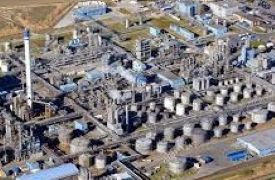The sites in Marl and Brunsbüttel in Germany and Augusta in Italy received ISCC-PLUS certification

Sasol Chemicals, a business unit of Sasol Ltd., has received International Sustainability and Carbon Certification (ISCC) for its three largest manufacturing plants in Europe.
The sites in Marl and Brunsbüttel in Germany and Augusta in Italy received ISCC-PLUS certification for the use of mass-balanced bio-based and recycled raw materials in the production of alcohols, ethyl oxates, linear alkyl benzenes and derivatives - all key building blocks for a wide range of consumer and industrial products.
"This is an important milestone in our sustainability strategy and a crucial prerequisite for further reducing CO 2 emissions," explains Jens Straatmann, Senior Vice President Eurasia Chemicals. “Our customers are increasingly asking for products made from sustainable raw materials. Our customers can rely on the fact that Sasol's high-performance products meet international standards for the procurement and use of circular and regenerative raw materials."
ISCC is a certification scheme that offers solutions to implement and certify sustainable, deforestation-free and traceable supply chains for raw materials from agriculture, forestry, waste and residues, for non-biological regenerative raw materials and for recycled carbon-based materials and fuels.
Sasol Chemicals' German production plants use mass-balanced bioethylene from plant-based biomass and waste products alongside recycled ethylene. The Augusta site uses mass balanced biobenzene, recycled benzene and biorecycled benzene. These sustainable products are blended with traditional raw materials using what is known as mass balancing, a significant step in the transition to a fully sustainable economy. Based on mass accounting, Sasol Chemicals can accurately track the flow of materials through its value chain to ensure its end products are ISCC compliant.
“The use of mass balancing is critical because it enables us to integrate sustainable materials into production, thereby meeting global chemical demand in a more environmentally friendly way,” said Shelley Grahmann, Senior Vice President, Strategy, Sustainability and Human capital. "Current availability of bio- and recycled materials is limited, but once they become more widely available we can expand their use and further reduce our reliance on fossil fuels."
Subscribe to our newsletter & stay updated.